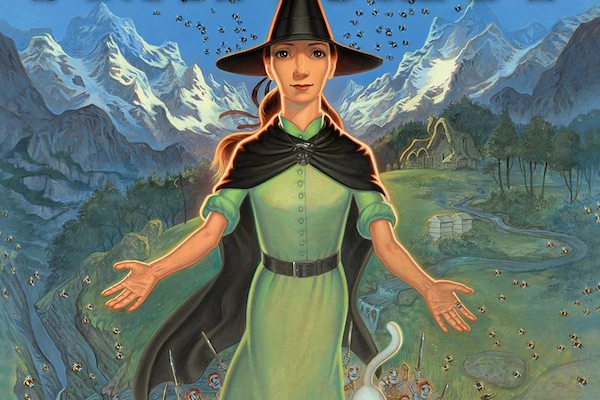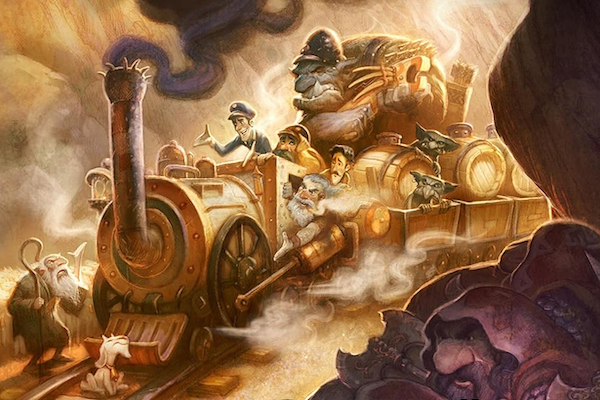Did you think that kissing the Duchess meant nothing?
Summary
The troop grabs the washing and gets into the “elevator” with two guards, but it gets stuck. They knock the guards out and proceed through a previous walled off tunnel, trying to reach the cellars where prisoners are being kept. Zombies awake in the tunnel, but Wazzer prays and it stops them from attacking. When Polly suggests that the Duchess was truly acting through Wazzer, it sets Tonker on edge and she almost tells Blouse that they’re all women. They wind up getting captured right as they make it to the dungeons, and are held in a nearby kitchen. Polly finally tells Blouse the truth about the squad, but he’s not upset—he’s read plenty of military history and knows that women make admirable soldiers across the world. Lord Rust comes in with a group of officers; he’s there with the Ankh-Morpork detachment, and offers them terms of surrender that would see them all escorted back into their country and Blouse detained in a nice home in Zlobenia. Vimes is there watching it all unfold, and Blouse tells Rust that he needs a moment in private to talk over the offer with his squad, baffling the officers. They talk it over and tell Rust to shove it because Polly rightly divines that they’re scared for some reason. They’re left in the kitchen.
Lofty has an idea to blow the door on the kitchen using old bags of flour; she’s done it before, many times in places where the Gray House sent her and she was mistreated. They do it, and Igorina tends to the wounded on the other side of the door while Blouse frees the prisoners in the dungeon. The released soldiers begin the process of taking back the Keep one bit at a time, and when Polly tells them they’re all women, the squad gets locked up by their own people. Major Clogston comes in and asks them to tell him everything so he can make notes; they’re going to be put on trial, but Mr. de Words has heard about their capture and making things complicated for Borogravia. Clogston asks if they wouldn’t all just go home as they were offered, but not all of them have someplace to go at any rate. Clogston’s goal is to prove that the tribunal should really be a court martial because they are real soldiers, which would give them a better chance on account of the procedures in that system. They are taken before General Froc, along with Jade and Maladict. Captain Strappi is only too happy to tell them what they’ve done wrong under Nuggan. The generals offer them a version of events: They were a group of women aiding a young hero, being Blouse, but the whole group decides to turn that down.
They hear the word “duck” and the ceiling caves, then Jackrum arrives. The Keep has been won from the enemy: He tells several of the men to leave the room and demands to speak his piece or he’ll go to the paper and tell Mr. de Worde. It turns out that the all the officers left in the room, including the general, are women that he trained. But Jackrum realizes that none of them knew about the others—they all thought they were alone. Froc says the squad can be recorded as men and continue on in the army. Polly protests: She wants to stay, but she wants to stay as herself. And when she brings up that they all kissed the Duchess, Wazzer’s body gets possessed by her. She promotes Jackrum to sergeant major and tells Froc that they must invade their own country, take care of their people, and stop worshipping Nuggan and her. Froc decides that the squad can serve as women, but that the higher ups should keep things a secret for now. Jackrum tells the squad to suit up because they’re the ones bringing the truce to their enemy. Polly tells off Strappi (and decks him) and learns that Clogston is also a woman. She and Jade and Maladict are sent to give the surrender, which Polly demands to deliver to Vimes. While they’re waiting, Maladict admits to being Maladicta.
Vimes is actually waiting for them in the waiting room, and takes them to his office. He explains the politics of the situation to them, that he had Angua and Buggy helping them out, and admits when Polly corners him about it that he does indeed have her brother, and will give him back to her. He will give their truce terms to the room of important men. Shufti finds her man and gives him the boot, rather than letting him get the dowry she’s been offered. Polly give another interview to William and the prince arrives and sees her, and have to be talked down from drawing a sword on her. Polly goes to talk to Jackrum and finally gets him to tell the truth—she’s a woman, too, who followed her man to war so she wouldn’t have to look after her brothers and a pig farm. Her man died, she had a son, her grandmother raised him to be an armorer, and he’s married with kids. But Jackrum doesn’t think she’ll be able to change much even in retirement, so Polly has a different solution: Go back as her son’s father. She’s shaken at the idea, but say she’ll consider it.
Six months later, food brought by dwarfs has seen the country through the winter. Wazzer is living in the general’s house; Tonker and Lofty have gone their own way; Jade found a partner and left; Shufti has moved into the Duchess and Polly’s brother dotes on her son Jack; Maladicta has disappeared; Igorina has opened up an obstetrics clinic. The Girls’ Working School has burned down, and Polly wears pants sometimes to work. There’s talk of war again—apparently, the prince of Zlobenia still wants his aunt’s country. She gets a package from Jackrum featuring a picture of him surrounded by his family, having taken her advice. He also has sent along his cutlasses and a book full of all his information on everyone in the army along with William de Worde’s business card. Polly writes a few letters, puts on her uniform, and leaves a note for her family (including Shufti and Jack). She takes the horse and heads for the ferry and waits for others who are intending to join up. Maladicta is there first, and then two lads, who are actually lasses. Polly tells them they can join up as men if they want to—they have a choice. But she will look after them, just as her sergeant did.
Commentary
Unsurprisingly, I am left here with every feeling about Jackrum and no idea where to put them all. *hands y’all a basket of emotions*
The story knows that Jackrum’s gender isn’t the point here. The narrative cues know it too, which is why the sergeant gets she pronouns when talking to Polly about her past, but then reverts to he pronouns now that he’s living with his family as his son’s long lost father. When you get the whole background from her, there’s no sense of attachment to gender in either direction; here is a person who rose through the ranks, lost everything that mattered, played the part of consummate sergeant, and has spent so long lying that the idea of being man or woman has ceased to have any meaning. Jackrum’s fear of going home as her son’s mother is that she is who she is, and that won’t be an acceptable maternal figure by anyone’s standards. She doesn’t appear sad about her lack of ability to “fulfill womanhood” so much as the loss of the only family she has left, and so much more by the wayside—her age, her history, her lover.
Polly’s suggestion gives Jackrum the chance to continue on as he is, but regain a vital missing piece of his life. It speaks to the real life histories of so many queer people from a bevy of intersecting identities: There are women in the past who lived their lives as men to achieve certain freedoms or live with a beloved partner as her husband. Were some of them possibly trans men who didn’t have the knowledge, the vocabulary, or even the desire to put voice to that difference? Of course. But specificity of identity doesn’t matter to everyone in the same way, and in Jackrum’s case, perhaps not at all. So many people would never understand that, hence Polly being the only person Jackrum could possibly have this conversation with.
And that’s relevant because, as the Duchess says through Wazzer: “I wish people would not be so careless about what they believe.”
Which is a line about religion and about nationalism and about gender, but also about identity at its core because that’s all any of these things are. Means of identification. Explanation of self. And so many of us are careless in that because it’s easier than having to spend the majority of your life parsing it out. (And you will, if you try.)
Gender is still all thoughts and rules anyhow: Polly notes Blouse’s “inner Daphne” because of course he’s got one. Tonker sees that the trouble of separating good guys and bad guys is the fact that it’s all men all the way down. The narrative tells us that “Men take over. It is probably because of socks.” Which is a superb way of not saying balls, and also a scathing way to point out that the anatomy isn’t the thing causing the behavior—it’s the idea of the anatomy. Your gender is an idea based on what parts people are assuming you’ve got. It genuinely can’t get more crystalline than that.
Still, when all is said and done, Polly comes back to that core most of Pratchett’s protagonists find: “The enemy wasn’t men, or women, or the old, or even the dead. It was just bleedin’ stupid people, who came in all varieties.” She might learn to fight this next war differently and prevent it from taking the same toll on her country. But having won so much for herself that she never dreamed possible, this is still what awaits her. It’s devastating to achieve so much and find that it’s practically nothing at all. They made a difference, but the world is still the world and people are still people. And the best Polly can do is put on her women’s uniform and make it easier for the next group coming along.
Asides and little thoughts:
- I just think we should have gotten to meet Wrigglesworth, after how much we heard about him and his petticoats. Guy clearly puts on a mean drag show, and I feel cheated.
- Though the “Ich bin ein Berliner” Kennedy line is basically the Big Foot of political flubs (being that it’s a myth), what’s being done here is an even deeper cut than it seems at face value. The Berliner doughnut is known as a Pfannkuchen in the city of Berlin, which translates in English to “pancake” and is yet another reason why the use of the word Berliner (even mispronounced) wouldn’t have been at all confusing in Kennedy’s speech. So Vimes accidentally saying he’s a cherry pancake is a joke with layers.
Pratchettisms:
It was barely brighter than a glowworm, but a single photon can do a lot of work in chthonic darkness.
Everyone but Polly had forgotten about him, and he stood there like an easy many to forget.
When the officers had retreated to the masculine safety of the corridor, the lieutenant turned to his squad.
The word was not whoomph. The experience was whoomph.
It came swiftly, like a blow, and Polly realized how wars happened. You took that shock that had run through her, and let it boil.
If a landslide is big enough, even square pebbles will roll.
The pen might not be mightier than the sword, but maybe the printing press was heavier than the siege weapon.
But a mere twitch of a leg was enough, just to see the idiot collapse in the ridiculous knock-kneed, protective crouch that is as instinctive to a man as saving half an onion is to a woman.
We’re off next week, but after that we’ll start A Hat Full of Sky! We’ll read Chapters 1-4…












